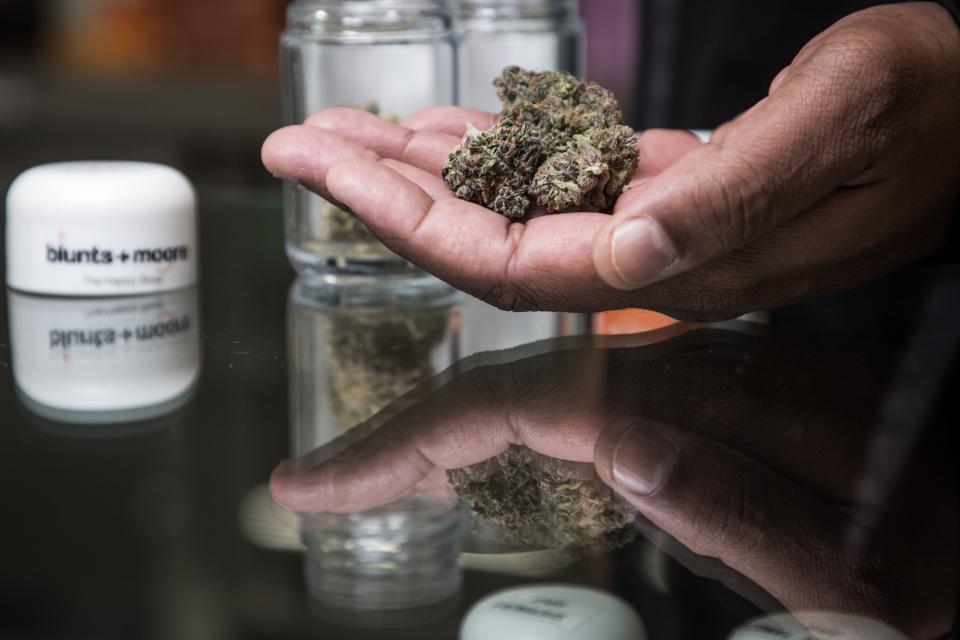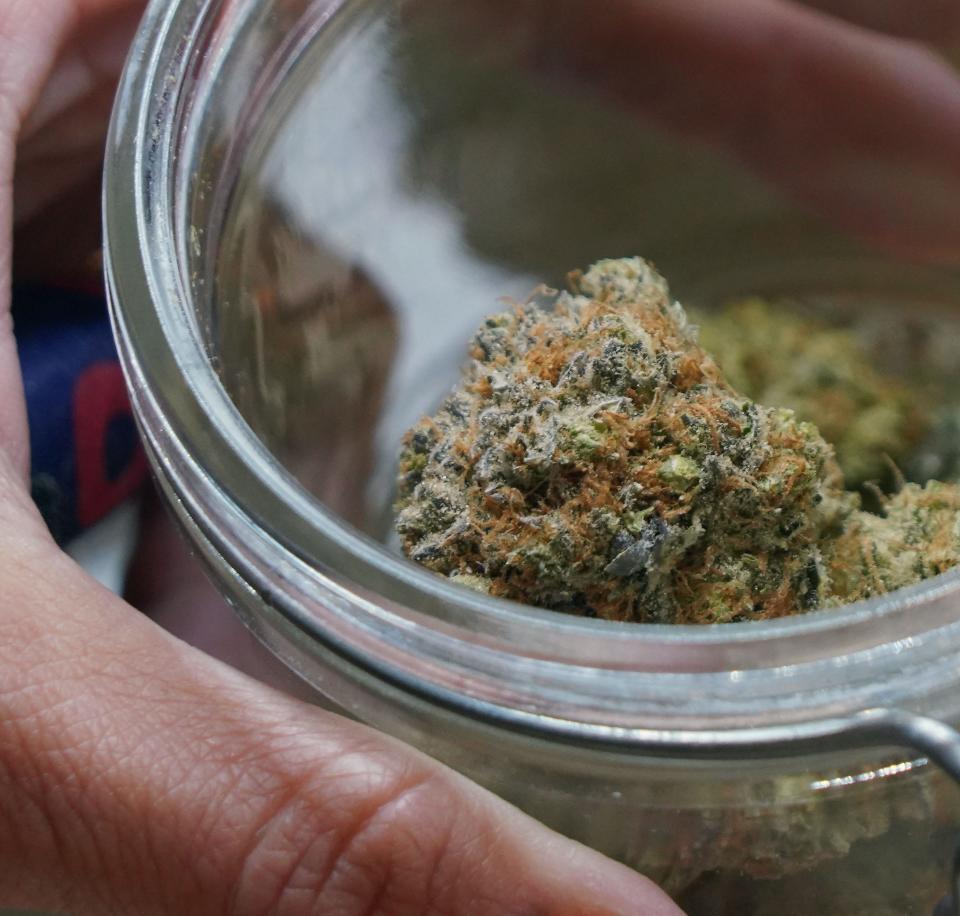Can Congress bag a cannabis bill? Marijuana legalization hopes may be soaring too high.
- Oops!Something went wrong.Please try again later.
- Oops!Something went wrong.Please try again later.
If you're old enough to buy booze, you could walk into a dispensary today in 18 states and buy marijuana products for recreational use. In 37 states, you could get permission to buy the drug for medicinal purposes. No need for a back-alley transaction. You could make your purchase in broad daylight in one of thousands of pot shops now operating under state rules to sell marijuana legally.
Yet, no matter which state you're in, you would still be committing a federal crime.
The brow-furrowing disconnect between federal prohibition and the patchwork of marijuana legalization rules at the state level has been an especially hot potato in the decade since Colorado and Washington became the first states to legalize weed for recreational use.
While President Barack Obama was in office, the Department of Justice issued a memo signaling the DOJ would generally refrain from enforcing the federal prohibition on marijuana in states that had legalized and regulated the drug.
But after President Donald Trump took office, the DOJ rescinded the memo and took other steps to project a tough-on-crime posture without actually cracking down on the legal marijuana boom.
Marijuana legalization was a mistake. Highly concentrated pot is destroying my son's life.
When voters elected President Joe Biden, they did so with assurances that his administration would not only pull back from Trump's approach but also go further than Obama had gone. On the campaign trail, Biden shied away from endorsing outright legalization, but he called for major reforms. "Nobody should be in jail for smoking marijuana," he said.
Biden didn't prioritize those cannabis policy reforms last year. Not surprising, given the pandemic. Will he do so this year? It's possible, but don't hold your breath. And if you want a job in Biden's White House, don't inhale and don't invest in marijuana, either. The administration is clearly not eager to be seen as marijuana-friendly.
Perhaps he's hearing from political advisers who suspect a push to legalize pot could hurt Democrats in this fall's midterm elections by arming Republicans with a readymade "soft on crime" smear, even though 91% of Americans favor legalization.
Or perhaps he's representing the views held by older Americans. At 79, Biden himself is in the age group least likely to support legalization in any form. What's more, Biden could be reticent to champion a position that would draw attention to his share of culpability in our nation's disastrous war on drugs.

There are steps Biden could take on his own to help clean up this mess, but the full slate of reforms we need will have to come from Congress, where lawmakers have shown bipartisan interest in the topic but have yet to get on the same page.
Still illegal? There's no excuse.
Wanda James, founder and CEO of Simply Pure Dispensary in Denver, is a cannabis business pioneer. She and her husband, Scott Durrah, were the first African Americans licensed in Colorado to own a marijuana dispensary. She has been in the business more than 13 years and recently told me federal policymakers have dragged their feet into absurdity.
"It's gotten to the point now where I believe we have jumped the shark into ridiculousness with the federal government," James said.
Even though James runs her business with Colorado's blessing, the lingering federal prohibition deprives her of tools other business owners take for granted – simple stuff, like the ability to process noncash transactions.
"It makes no sense for a business that's registered with the secretary of state to not have a bank account, to not have a credit card, to not have regular business deductions, to not be able to write off my employees. … I mean, there's no excuse for it. It's ridiculous," she said.
To solve some of those problems, the House has repeatedly passed the Secure and Fair Enforcement Banking Act, an incremental reform with bipartisan backing. The bill would give legitimate cannabis-related businesses access to the banking system and allow the Internal Revenue Service to collect taxes more effectively. It's a commonsense bill that the Senate should have passed years ago, even though it doesn't go far enough.
Our marijuana laws put people in peril: It's past time for federal cannabis reforms. Start with this banking bill.
James said she likes the SAFE Banking Act and other proposals that have been bandied about: "I'm in favor of everything that moves us forward. ... I've been in politics long enough that we have to keep moving this needle forward."
But she and others have rightly noted that we cannot have a serious conversation about marijuana legalization without acknowledging how prohibition has disproportionately harmed Black and Indigenous folks and people of color.
Black people are 3.6 times more likely than white people to be arrested for marijuana possession, according to the American Civil Liberties Union. Even in states that legalized or decriminalized pot possession, driving arrests down overall, Black people were still more likely than white people to be arrested for possession.
Big-government boondoggle: Why conservatives should support legalizing marijuana
The United States has recorded hundreds of thousands of marijuana arrests in each of the past 50 years, and those arrests often pull people out of their communities and make it harder to find work, housing and other opportunities. Think about the ways those consequences have rippled through communities and generations.
When the federal government finally legalizes marijuana, we must insist on policies that promote social equity for communities that have suffered most. Some lawmakers are aiming to do just that.
Huffing and puffing and passing a bill
Three pieces of legislation for comprehensive marijuana policy reform are under consideration on Capitol Hill, where Democrats hold slim majorities in both chambers.
There's the Marijuana Opportunity Reinvestment and Expungement Act, which the House passed this month, with support from 217 Democrats and three Republicans. But pretty much no one expects the Senate to pass the MORE Act.
Instead, we're waiting for three Democratic senators to introduce their own bill, the Cannabis Administration and Opportunity Act, which they previewed last year. (The trio had suggested they could formally introduce the bill on April 20 or shortly thereafter, but they pushed that timeline back last week and said to expect the CAO Act before the Senate's recess in August.)
Marijuana legalization: Too much cash and other problems Congress needs to resolve
The third piece of comprehensive legislation, the States Reform Act, is a Republican-backed effort that, like the MORE Act and CAO Act, would decriminalize marijuana and expunge criminal records for nonviolent federal cannabis offenses. Unlike the other two bills, the SRA skimps on provisions related to social equity and restorative justice – provisions that are central in the proposals Democrats have put forward. The SRA would also impose a lower federal tax rate.

Our predicament is one in which those who have been penalized for cannabis crimes are disproportionately Black and brown while those who have capitalized on legalized pot are overwhelmingly white. If we legalize cannabis without addressing this disparity, we will perpetuate the injustice we're aiming to correct.
To be clear, the lawmakers sponsoring the SRA recognize the importance of comprehensive reform. Their bill may be best understood as a good-faith starting position in the bipartisan discussion to come. After all, two of the SRA's cosponsors were among the three Republicans who voted in favor of the MORE Act this month.
Since the Senate is evenly split between the parties, at least 10 Republicans would need to join the Democratic caucus to overcome a likely filibuster. That's a tall order.
As eager as we should be for Congress to reach a deal to legalize weed, we must not settle for a law that ignores history and fails to address the ill effects of our war on drugs.
Steven Porter is an assistant editor for USA TODAY Opinion. Follow him on Twitter: @reporterporter
This column is part of a series by USA TODAY Opinion about police accountability and building safer communities. The project began in 2021 by examining qualified immunity and continues in 2022 by examining various ways to improve law enforcement. The project is made possible in part by a grant from Stand Together, which does not provide editorial input.
You can read diverse opinions from our Board of Contributors and other writers on the Opinion front page, on Twitter @usatodayopinion and in our daily Opinion newsletter. To respond to a column, submit a comment to letters@usatoday.com.
This article originally appeared on USA TODAY: Legal weed: On 420, High hopes for a cannabis bill are budding

